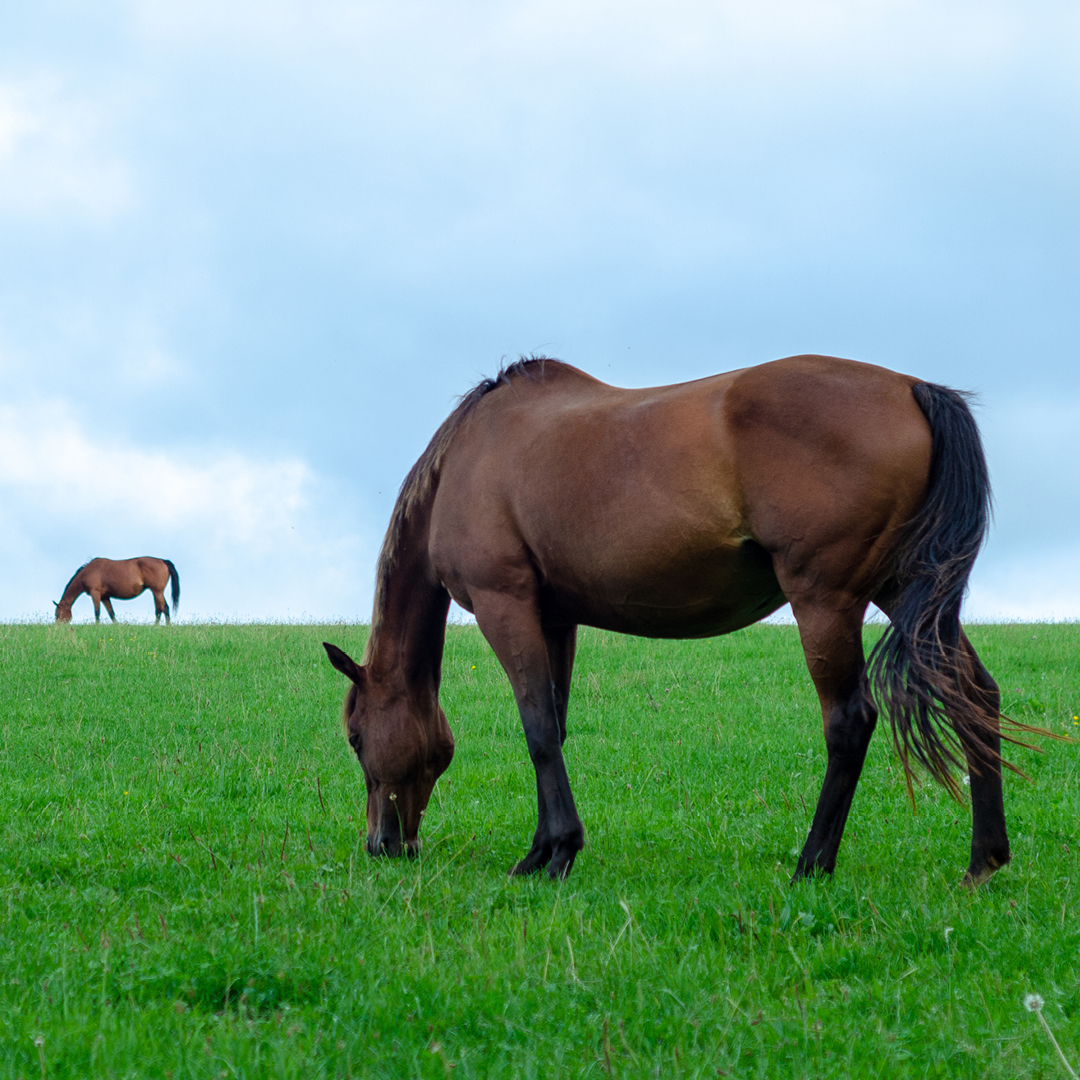New research is demonstrating that high levels of worms and/or frequent de-worming affects the horse’s gut population (the Microbiome). To optimise the high level of nutrients your horse receives from their feed, it is important to make sure management is correct.
We must change the way we control worm populations in horses, without the regular use of de-worming (anthelmintic) drugs, as parasites are becoming resistant. A year-round plan that includes regular faecal worm egg counts, tapeworm saliva checks, and a redworm ELISA blood test taken in late Autumn, between October and December, will help.
An example annual parasite control plan for normal adult horses that are healthy and grazing in well managed and steady groups, may look like the below:
Spring
- In anticipation of increased turnout after the winter months, perform a worm egg count (WEC) on all the horses. Follow the advice from your vet or the facility that has performed the WEC to ensure that the individuals that need to be treated with an appropriate product prior to turn out onto pasture.
- Always seek advice about the type of de-wormer that needs to be used and the duration of time your horse should stay in after administration of that product
- A Tapeworm Saliva test should be performed to check the horse’s antibody levels to help evaluate whether the horse has a Tapeworm problem. There are only two types of de-wormers available for this purpose, so it is vital that they are only used when necessary.
Summer
- Repeat worm egg counts every 4-8 weeks throughout the grazing period.
Autumn
- In late autumn (October through December) a red worm blood test can be performed to determine the population density of encysted redworm (hiding in the gut wall). Dependent on the result, again, follow the advice provided in terms of the type or selection of de-wormer(s) to administer.
- A Tapeworm Saliva test should be performed to check the horse’s antibody levels to help evaluate whether the horse has a Tapeworm problem. There are only two types of de-wormers available for this purpose, so it is vital that they are only used when necessary.
Winter
- In winter and early spring there are some areas of the country where horses will be more susceptible to contracting Liver Fluke. A FEC collected over 3 days can test for this. Warm wet winters increase the risk, of which this past winter was one.
Year-Round Management Considerations
- Frequent poo-picking is essential, as the migration of the larvae can happen within 24 hours, and rainfall can speed up this migration
- Keep muck heaps a minimum distance of 100m away from the grazing areas
- Consider co-grazing. Small ruminants (like sheep) can hoover up parasite eggs
- Rotate paddocks where possible so they get a chance to “rest” and grow back before they are grazed down to soil level
- Know your horse’s accurate weight to ensure appropriate de-wormer dosing
- If your horse has a high worm egg count and is given a de-wormer, the droppings should be collected rapidly
- Post worming WECs (14 days post worming) can give a good indication as to whether the drug has resistance in that particular yard or individual
An overview of up to date anti-parasite advice from two centres that have collaborated to gather as much information as possible, the Moredun Trust and the Horse Trust, can be found through access of the following links:
https://www.moredun.org.uk/research/diseases/parasitic-roundworms-equine
http://www.horsetrust.org.uk/assets/downloadableFiles/EquinehelminthcontrolguidelinesFIN2019.pdf
Further discussion of the critical and ongoing de-wormer resistance problem can be found here: -
https://www.youtube.com/watch?v=rouEuq7fXH0
Worm control strategies for young horses and horses that have health concerns (especially those with PPID/ Cushing Disease), should potentially include more frequent WECs and more importantly, individualised veterinary advice. There is unfortunately no “one-size fits all” approach and therefore keeping up to date on the latest scientific research and current advice from your veterinarian is vital to manage the population of worms in the environment and their resistance.
The presence of parasites in the intestines, and/or the use of anti-parasitic medications can impact the microflora present in the intestinal tract. The microbiome is recognised as an important marker of digestive health. At Dodson & Horrell, we build in a range of digestive supplements into our concentrates, forages, and supplements to help support the microbiome and the functionality of the horse’s intestines. The range of additives we use include the probiotic Actisaf yeast, shown to benefit fibre fermentation, the prebiotics MOS and FOS which help the maintenance of a healthy bacterial profile, psyllium seed which supports continued digestive transit, and a bespoke extruded fibre blend known as Fibre Complex, shown to increase hindgut fermentation of forage. We additionally offer forage analysis services through our laboratory to be able to help the design of an appropriate dietary plan for your horse, to best support the maintenance of their ongoing digestive health.
If you would like to discuss products which include the above supplements, such as Digestive Support and Fibre Fusion, or our forage analysis services, please contact out Nutritional Helpline.




